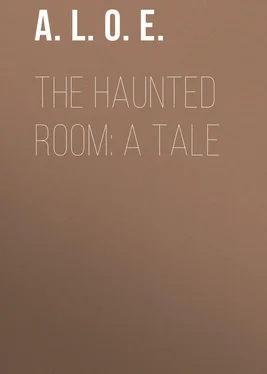A. L. O. E. - The Haunted Room - A Tale
Здесь есть возможность читать онлайн «A. L. O. E. - The Haunted Room - A Tale» — ознакомительный отрывок электронной книги совершенно бесплатно, а после прочтения отрывка купить полную версию. В некоторых случаях можно слушать аудио, скачать через торрент в формате fb2 и присутствует краткое содержание. Жанр: foreign_antique, foreign_prose, на английском языке. Описание произведения, (предисловие) а так же отзывы посетителей доступны на портале библиотеки ЛибКат.
- Название:The Haunted Room: A Tale
- Автор:
- Жанр:
- Год:неизвестен
- ISBN:нет данных
- Рейтинг книги:5 / 5. Голосов: 1
-
Избранное:Добавить в избранное
- Отзывы:
-
Ваша оценка:
- 100
- 1
- 2
- 3
- 4
- 5
The Haunted Room: A Tale: краткое содержание, описание и аннотация
Предлагаем к чтению аннотацию, описание, краткое содержание или предисловие (зависит от того, что написал сам автор книги «The Haunted Room: A Tale»). Если вы не нашли необходимую информацию о книге — напишите в комментариях, мы постараемся отыскать её.
The Haunted Room: A Tale — читать онлайн ознакомительный отрывок
Ниже представлен текст книги, разбитый по страницам. Система сохранения места последней прочитанной страницы, позволяет с удобством читать онлайн бесплатно книгу «The Haunted Room: A Tale», без необходимости каждый раз заново искать на чём Вы остановились. Поставьте закладку, и сможете в любой момент перейти на страницу, на которой закончили чтение.
Интервал:
Закладка:
“Good-bye, captain,” cried Vibert, as he shook hands with his uncle; “come to Myst Court next spring, and you and I will make a raid on the haunted chamber.”
“Where is Bruce? I have not wished him good-bye,” said the captain, pausing when he was about to hand his niece into the carriage.
“Bruce!” called the clear voice of Emmie, as she ran back to the bottom of the staircase to let her brother know that the guest was on the point of departing.
“Bruce!” shouted Vibert with the full strength of his lungs.
There was no reply to either summons, and Emmie suggested that her brother might have gone out, not remembering that the carriage had been ordered so early. After a few minutes’ delay, Arrows handed her into the carriage, with the words, “You will bid Bruce good-bye for me.”
“None so deaf as those who won’t hear,” muttered Vibert, when the vehicle had rolled from the door. “Bruce heard us call, but he is in a huff, and did not choose to appear. He repels advice, resents reproof , and yet won’t believe that he’s proud! No more, perhaps, than I believe that I’m selfish!”
CHAPTER VII.
MISTRUST
“I am so glad to have a little time for quiet conversation with you, dear uncle,” said Emmie, as the carriage in which she was seated beside Arrows proceeded along the drive. “I want to ask you,” – she hesitated, and her voice betrayed a little nervousness as she went on, – “what it was that you meant when you bade me conquer Mistrust? ”
“Let me refer you to our old favourite, the Pilgrim’s Progress,” replied the captain. “In whose company did the dreamer represent Mistrust, when he ran down the Hill of Difficulty to startle Christian with tidings of lions in the way?”
“In the company of Timorous,” said Emmie.
“And have you no acquaintance with that personage?” asked the captain.
“Oh, then you only mean that I am a little timid and nervous,” said Emmie, a good deal relieved. “That is no serious charge; you let me off too easily.”
“Not so fast, my dear child. Let us examine the allegorical personages more closely. Timorous and Mistrust are not only found together, but they are very closely related.”
“You would not have me a Boadicea or a Joan of Arc?” asked Emmie, smiling.
“I would have you – what you are – a gentle English maiden; but I would have you more than you now are, – that is to say, a trustful Christian maiden,” replied Captain Arrows.
“Surely courage is a natural quality, which belongs to some and not to others,” observed Emmie Trevor. “Besides, if it be a virtue at all, it is surely a man’s rather than a woman’s.”
“Mere physical courage, such as ‘seeks the bubble reputation e’en in the cannon’s mouth,’ is not a Christian virtue,” said the captain; “it may be displayed by infidel or atheist. The courage which is a grace, a grace to be cultivated and prayed for, is that childlike trust in a Father’s wisdom and love, by which the feeblest woman may glorify her Maker.”
“Faith in God’s wisdom and love! Oh, you do not surely think that I am so wicked as ever to doubt them! I have many faults, I know, but this one – ” Emmie stopped short, startled to find on her tongue almost the very words which had been given as a sign that the bosom sin had been tracked to its lurking-place.
“You remember,” said Captain Arrows, “that a few days ago I listened to your singing that fine hymn which begins with the lines, —
‘Lord, it belongs not to my care
Whether I die or live.’”
“Yes,” replied Emmie Trevor; “and you told me that, much as you admired that hymn, you did not think it suited for my singing. I supposed that you thought it too low for my voice.”
“No, I thought it too high for your practice. Could it be consistently sung by one who that morning had been in nervous terror at the scratch of a kitten; one who owned that she would scarcely dare to nurse her best friend through the small-pox; one who, even with my escort, could not be persuaded to cross a field in which a few cows were grazing?”
“Oh, uncle, how can you take such trifles seriously!” cried Emmie, a good deal hurt.
“Because I wish you to take them a little more seriously,” replied Captain Arrows. “You have hitherto regarded unreasonable fear as an innocent weakness, perhaps as something allied with feminine grace, and not as a foe to be resisted and conquered. I see that fear is at this time throwing a shadow over your path; that you would be happier if you had the power wholly to cast it aside.”
“I have not the power,” said Emmie. The words had scarcely escaped her lips when she wished them unspoken, for she was ashamed thus to plead guilty to a feeling of superstitious alarm.
“Let us then trace the parentage of unreasonable fear,” said Captain Arrows. “I use the adjective advisedly. There are cases where the nerves are so shattered by illness, or enfeebled by age, that fears come on the mind, as fits on the body, not as a fault but as a heavy affliction. There are also times of extreme and awful danger, such as that of the Indian Mutiny, when faith must indeed have had a dread struggle with fear; though even then, in the hearts of tender women, faith won the victory still. But I am speaking of that fear which common sense would condemn. Such fear is, must be, the offspring of mistrust, and its effects show it to be a tempter and an enemy of the soul.”
“What effects do you mean?” said Emmie.
“These three at least,” answered the captain. “Unreasonable fear hinders usefulness, destroys peace, and prevents our glorifying God.”
“I do not quite see how it should do so,” murmured Emmie.
“It hinders usefulness,” said her uncle; “like indolence, fear is ever seeing ‘a lion in the street.’ Does not fear hang like a clog on the spirit, making ‘I dare not’ wait upon ‘I would,’ even when duty to God and mercy to man is in question?”
Arrows paused as if for a reply. Emmie gave none; her eyes were gazing out of the carriage window on the smoky veil which hung over the great city which they were approaching; she knew that she dared not do, what thousands of her sex are doing, go as a child of light to carry light into the abodes of darkness. Emmie had owned in her uncle’s presence that she was far too timid to visit the poor.
“Then fear destroys peace,” continued the captain, “and I believe that it does so to a greater extent than does any other passion which troubles the soul, remorse only excepted. If we literally and fully obeyed the command so often repeated in Scripture, to hope and to be not afraid, a mountain of misery would be removed at once and cast into the sea. If you do not mind a personal application of the subject, would you, my dear child, feel uneasy at going to a house which is called haunted, if you realized that God fills all space, and that you are everywhere under His loving protection?”
Emmie still continued silent, looking out of the carriage window. Her feelings were those of deep mortification. That she, earnestly pious as she was, should virtually be accused of want of faith, that her deficiency in this first requisite of religion should have been so glaring as to have attracted the notice of a partial relative, was a trial the more painful from being totally unexpected.
“Bunyan represents Mistrust, the parent of unreasonable fear, as a robber,” pursued the captain, referring again to that allegory which gives so wondrously true a picture of man’s spiritual state. “We first meet Mistrust in company with Timorous, and their object is to discourage, to frighten, to make Christian start back from the perils which would meet him if he pursued the path of duty; when we next hear of Mistrust, he is in company with Guilt, and together they rob Little-faith of his treasure.”
Читать дальшеИнтервал:
Закладка:
Похожие книги на «The Haunted Room: A Tale»
Представляем Вашему вниманию похожие книги на «The Haunted Room: A Tale» списком для выбора. Мы отобрали схожую по названию и смыслу литературу в надежде предоставить читателям больше вариантов отыскать новые, интересные, ещё непрочитанные произведения.
Обсуждение, отзывы о книге «The Haunted Room: A Tale» и просто собственные мнения читателей. Оставьте ваши комментарии, напишите, что Вы думаете о произведении, его смысле или главных героях. Укажите что конкретно понравилось, а что нет, и почему Вы так считаете.











